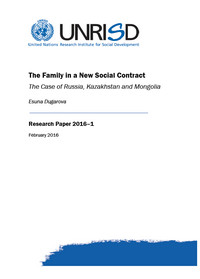- Author(s): Esuna Dugarova
- Programme Area: Social Policy and Development
- Paper No.: 1
- Code: RP 2016–1
- No. of Pages: 62
This paper examines the evolution of the family in both conceptual and empirical terms, as well as family support policies, in Russia, Kazakhstan and Mongolia after the dissolution of the Soviet Union. It argues that family support is a central element of a transition to a new social contract in these countries. It uses the systematic analysis of parental leave policies, childcare services, and family allowances and child benefits to understand the nature of the emerging welfare model in the three cases more deeply.
While within social and family policy debate, considerable attention has been paid to advanced welfare states and increasingly to countries in the Global South, the new independent states of the former Soviet Union have remained relatively neglected. This study thus aims to fill a gap in this research and policy area. The paper is further framed within a broader consideration of trends in development of families and family support policies globally and over time.
Being part of the same Soviet social welfare system, Russia, Kazakhstan and Mongolia transitioned from socialism simultaneously, having similar economic trajectories and demographic concerns at the outset. The study proposes a three-stage periodization of family support policies in these countries: (i) family destabilization in 1991–1999 that saw the collapse of the old social contract accompanied with drastic changes in economy and society; (ii) family revival in 2000–2007 that marked the resurgence of family support enabled by economic growth, putting families at the core of the new social contract; and (iii) family strain in 2008–2016 where the fiscal basis for family support policies has been undermined by economic crises, intensifying the vulnerability of families to poverty.
In response to the challenges that Russia, Kazakhstan and Mongolia have faced during transition, the respective governments adopted a pronatalist approach to family support policies, with some variation in measures within this approach and outcomes for families. The analysis of data on social spending, specific family support policies, as well as the priorities and concerns of the three governments, reveals a dissonance between the state rhetoric of the importance of the family as a social institution and the reality of its policy interventions. Despite some significant state efforts to support families, which contributed to the increase in fertility and reduction in poverty in these countries, there has not been sufficient emphasis on the quality of care services for children and the elderly, work-family reconciliation and gender equality.
The analysis further points to a shift in the relationship between the state, society and family within the new social contract, which entails more family autonomy and involves the partnership between the state, family and other actors including the private sector and non-governmental organizations. The underlying principle of self-responsibilization that serves as the basis of this relationship reflects a trend towards refamilialization in these contexts. The study indicates that these countries represent a hybrid welfare model, with a dominant liberal part and some distinct elements of the conservative model and to a much lesser extent of the social-democratic model.
The study also finds a growing tension in the institution of the family in Russia, Kazakhstan and Mongolia (as well as more globally), which has a negative impact on the structure, composition and well-being of families. To improve this, the paper suggests that family support policies in these countries could focus on ameliorating the access and quality of social services for children and the elderly, creating family-friendly employment opportunities with equal amount of paid maternity and paternity leaves, eradicating poverty through increasing incomes and social payments, and enhancing gender equality through reducing unpaid care work and promoting shared responsibility within the family. This all can help generate better future returns in terms of economic growth, human capital development and social cohesion.
Esuna Dugarova is a Research Consultant at the United Nations Research Institute for Social Development (UNRISD).
Link: The Family in a New Social Contract: The Case of Russia, Kazakhstan and Mongolia








 Users Today : 2
Users Today : 2 Total Users : 35460211
Total Users : 35460211 Views Today : 3
Views Today : 3 Total views : 3418898
Total views : 3418898